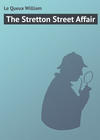Loe raamatut: «The Day of Temptation», lehekülg 6
Chapter Eleven
Silence is Best
“Let the police enter,” Armytage said, still pressing her slim figure in his arms. “You know, Gemma, that I love you.”
“No, no,” she cried trembling; “I will see them alone. I must see them alone.”
“Why?”
“I cannot bear that you should stand by and hear the terrible charge against me,” she answered hoarsely. “No, let me go alone to them;” and she struggled to free herself.
But he grasped her slim wrist firmly, saying, “I love you, and will be your protector. If they make allegations against you, they must prove them. I, the man who is to be your husband, may surely know the truth?”
“But promise me that you will not heed what they say – you will not believe their foul, unfounded charges,” she implored, lifting her pale face to his.
“I believe implicitly in you, Gemma,” he answered calmly. “Let them come in.”
Gemma, her hand in that of her lover, stood blanched and trembling in the centre of the room as the two police officers in plain clothes entered.
One was a tall, broad-shouldered, middle-aged man with a pleasant face, a pair of dark, piercing eyes, and tiny coal-black moustache; while the other was younger, and, from the bronze of his countenance, evidently a Silician.
“We are police officers,” the elder man exclaimed. “We would prefer to speak to the signorina alone.”
“I am the closest friend of the signorina,” Armytage said calmly. “I am about to make her my wife.”
The officer shrugged his shoulders, exhibited his palms, and a sarcastic smile played about his lips.
“If I may presume to advise the Signor Conte,” he said, “I certainly think that it would be best if I spoke to her alone.”
And Gemma, clinging to her lover, gazed imploringly into his face, adding – “Yes, caro. Let them speak to me alone.”
“No,” the young Englishman answered firmly.
“But the matter is a delicate one – extremely delicate,” urged the delegato. “I certainly think that the signorina should be allowed to decide whether or not you should be present.”
“In a week or so we shall marry,” declared Armytage. “What concerns signorina also concerns myself.”
“To please me, caro, will you not go out of the room for a moment?” Gemma cried in a low voice of earnest supplication.
Her attitude was that of one who feared the revelation of some terrible secret, and in those moments her lover had become filled with a keen desire to penetrate the cloak of mystery which enveloped her.
“No,” he answered her, after a brief silence; “I have decided to remain and hear what the signor delegato has to say.”
The police official and the trembling woman exchanged quick glances. In the officer’s gaze was a look of sympathy, for perhaps her beauty had softened his impressionable Italian nature; in her blue eyes was an expression of humiliation and abject fear.
“My mission is very quickly accomplished,” the delegato exclaimed slowly.
“You intend to arrest!” Gemma cried hoarsely. “I – I have dreaded this for a long time past. I knew that, one day or other, you would come for me, and my reputation would be ruined for ever.”
“Listen, signorina,” the official said gravely. “Certain information has been obtained by the Questore, and upon that information I have been sent here to you. Much as I regret to disturb you, signorina, the Questore, after carefully considering certain statements before him, has decided that your presence is undesirable in Livorno, and, further, he wishes me to inform you that to-day you must leave this city.”
Gemma, her face white and drawn, humiliated and abased, sighed deeply, then breathed again more freely. She had expected arrest, but instead was ordered out of Livorno. To say the least, the police had been merciful towards her.
“Then I must leave to-day?” she repeated mechanically.
“Yes, signorina. The penalty for remaining here after this order of the Questore is immediate arrest,” he said.
“But why is this course pursued?” Armytage asked. “For what reason is the presence of the signorina deleterious in the city? It all seems very remarkable to me.”
“The information before the Questore is of a very confidential character, signore.”
“Are you not aware of the allegations against her?”
“No,” he replied; “I have only been deputed to warn her to leave Livorno.”
“Is such a measure frequently resorted to?”
“Usually we arrest the suspected individual, question him, and afterwards deport him to the railway station, if there is not sufficient ground to justify a prosecution. In this case there is just a simple warning. Only in very exceptional cases is the course followed which the Questore is now pursuing.”
“Then you have no knowledge of the actual charge in this case?”
“No, signore, I have not. But,” he added, “the signorina must herself know the reason.”
Armytage turned quickly to her. Their eyes met for a single instant. Then she slowly nodded, saying in an indistinct voice: “Yes, yes, I know only too well the reason of this. I must leave Livorno – leave Italy, my own country that I love, never to return.”
“That would be the very best course to pursue,” the delegato urged. “If you leave Italy, signorina, you will, I think, hear no more of the unfortunate affair. Indeed, I have strong reasons for believing that the Questore has acted in the manner he has done purposely, in order that you should be afforded an opportunity to leave Italy.”
“He thinks that exile is preferable to imprisonment,” she said aloud, as if reflecting. “Well, perhaps he is right;” and she laughed a short, hollow laugh.
“Yes,” urged Armytage, “you must leave to-night.” She was silent. The police official exchanged glances with the tall, good-looking young Englishman, then said, bowing politely —
“I will wish you adieu, signore. A thousand pardons for disturbing you; but it was my duty, therefore pray forgive me.”
“Certainly, certainly,” he replied; and both men went out bowing, leaving Armytage alone with the woman he loved.
“All this is strange – very strange,” he observed when they had gone. He was puzzled; for, after all, he now knew no more than what Consul Hutchinson had already told him.
“Yes,” she said slowly, “to you it must appear extraordinary, but to me, who expected it and who dreaded it, it was only what might be anticipated. They have warned me out of Italy, it’s true; but if they knew everything,” she added – “if they knew everything, I should to-night be placed in a criminal’s cell.”
“Why?”
“Already I have told you it is impossible for me to explain,” she answered vehemently, in her voluble Italian. “If you really love me, it is surely sufficient to know that the police are in ignorance of facts which I feared were revealed; and that they have not obtained the one item of information necessary to effect my ruin and disgrace.”
“Why do you speak like this?” he demanded quickly. “Has your past life in Florence been so full of mystery that you fear its exposure?”
“There are certain matters which I desire to keep secret – which I will keep secret, even if it costs me the loss of you, the man I adore,” she answered fiercely.
“Then they are matters which surely concern me – if I am to be your husband,” he said gravely.
“No,” she answered calmly, still pale to the lips; “they only concern myself. I admit freely that there is a secret connected with my past – a secret which I shall strive to preserve, because its revelation would, I know, cause you, my beloved, much worry and unnecessary pain. I therefore prefer to hide this truth and fight my enemies alone.”
“Is not this secret one that, before marrying you, I ought to know?” he demanded earnestly.
“It cannot concern you in any way,” she declared. “True, it has reference to my past life, but surely you don’t believe me to be an adventuress – do you?”
“Of course not, piccina,” he answered, laughing, as he again placed his arm tenderly around her waist. “You an adventuress! What made you suggest such a thing?”
“I must be an enigma to you,” she said. “But believe me, I would tell you everything if I could see that you could be benefited in the least. The story is a long and wretched one; and when I reflect upon the closed chapter of my life’s history, I am always dolorous and unhappy. The more so because I’m unable to confide in you, the man I love.”
“Will you explain all to me some day?”
“Yes, everything. At present, if I were to tell you, the result would only be disastrous to myself, and in all probability wreck your happiness. Silence is best now – far the best.”
His face wore a heavy expression of disappointment and dissatisfaction. Truth to tell, the whole matter was so utterly inexplicable that he entertained serious misgivings. She noticed this, and raising her sweet face, now no longer haggard, but pale and sweet-looking, she added —
“Cannot you trust me further, Nino?”
“Trust you, darling!” he cried. “Why, of course I can. Only all this secrecy worries me.”
“Ah no! Don’t think of it any more,” she urged. “To-night I will leave with you for Paris. I have a friend there to whom I can go. Afterwards, in London, we will marry – if you still desire that we should.”
The last words were uttered in a low, tremulous, hesitating tone.
“Still desire!” he echoed. “I still love you as fondly – ah! even more fervently than before. If you would only confide in me, I should be entirely happy.”
“At present that is impossible,” she declared. “Some day, before long, I hope to be in a position to tell you everything.”
“And you are ready to go to London?” he observed. “Half an hour ago you said you did not wish to go to England!”
“True, because I feared to go. Now I no longer fear. I am ready, even eager to accompany you if you still wish.”
“Then we will go straight to Paris; and when I have concluded my business, which will occupy perhaps a couple of days, we’ll go on to London.”
“Benissimo!” she answered, raising her full, red lips to his. “I so want to see your great and wonderful London, caro. I’ve read so much about it. It must be gigantic. I shall be so happy and content with you as my guide. To see London has ever been the dream of my life.”
“Ah! I’m afraid you’ll be sadly disappointed, piccina,” he said, again smiling. “After your bright, beautiful Italy, our busy, bustling, smoke-blackened city will seem terribly dull, monotonous, and dreary. The sky is seldom blue, and the atmosphere never clear and bright like this. In your Tuscany everything is artistic – the country, the towns, the people; but in England – well, you will see for yourself.”
“But there are lots of amusements in London,” she said, “and life there is always gay.”
“For the rich, London offers the greatest and most diverse attractions of any place in the world; but for the poor, herded together in millions as they are, it is absolutely the worst. In Italy you have much poverty and distress, but the lot of the poor man is far easier here than in toiling, turbulent, over-crowded London.”
“One never appreciates the town in which one lives, be it ever so beautiful,” she laughed.
“Well, be patient, and you shall see what London is like,” he said. “But it is already two o’clock. You must lunch, and afterwards pack your trunks. Our train leaves at half-past nine to-night, and at Pisa we shall join the night-mail to the frontier. I’ll wire to the sleeping-car office in Rome, and secure our berths in the through car for Paris.”
“Ah! Nino,” she exclaimed happily, “I am content, very content to leave Italy with you. An hour ago I had reasons for remaining; but now it is, of course, impossible; and, strangely enough, I have no further object in staying here.”
“And you will not regret leaving?”
“Of course not,” she said, flinging herself into his ready arms and shedding tears of joy. “I fear nothing now, because I know that you love me, Nino,” she sobbed. “I know you will not believe anything that is alleged against me. You have asked me to marry you, and I am content – ah! absolutely content to do so. But even now I do not hold you to your promise, because of my inability to divulge to you my secret. If you think me untrue or scheming, then let us part. If you believe I love you, then let us marry in England and be happy.”
“I love you, Gemma,” he answered low and earnestly. “Let us go together to London, and let this be the last hour of our doubt and unhappiness.”
Chapter Twelve
A Word with His Excellency
One morning, about ten days after Armytage had left Leghorn with Gemma, a rather curious consultation took place at the Italian Embassy in Grosvenor Square between Count Castellani, the Ambassador to the Court of St. James’, and Inspector Elmes, of the Criminal Investigation Department.
The Ambassador, a handsome, grey-haired man of sixty with courtly manner as became the envoy of the most polite nation in the world, stroked his beard thoughtfully while he listened to the detective. He was sitting at his big writing-table in the small, well-furnished room where he was in the habit of holding private conference with those with whom the Chief Secretary of Embassy had no power to deal. Elmes, smart, well-shaven, and ruddy, sat in a large easy chair close by, and slowly explained the reason of his visit.
“I remember the case quite well,” His Excellency exclaimed when the detective paused. “Some papers regarding it were placed before me, but I left my Secretary to deal with them. The girl, if I remember aright, arrived in London from Livorno accompanied by an unknown Englishman, and was found dead in a cab at Piccadilly Circus – mysteriously murdered, according to the medical evidence.”
“The jury returned an open verdict, but without doubt she was the victim of foul play,” Elmes said decisively.
“One moment,” the Ambassador interrupted, placing his hand upon an electric button upon the table.
In answer to his summons the thin, dark-faced Neapolitan man-servant appeared, and by him the Ambassador sent a message to the Secretary, who in a few moments entered.
He was younger by ten years than the Ambassador, foppishly dressed, but nevertheless pleasant-faced, with manners which were the essence of good breeding.
“You remember the case of the girl – Vittorina, I think her name was – who was found dead in a cab outside the Criterion?”
“Yes.”
“Did we make any inquiries of the police in Livorno regarding her identity?”
“Yes. Do you wish to see the reply?”
“You might send it in to me at once,” the Ambassador said; and the Secretary withdrew.
“What you have told me is certainly extraordinary – most extraordinary,” exclaimed His Excellency, addressing Elmes.
“All the inquiries I have made point to the one fact I have already suggested,” the detective said. “At Scotland Yard we received a request from your Excellency that we should carefully investigate the matter, and we are doing so to the very best of our ability.”
“I’m sure you are. I well recollect now signing a formal request to your Department to make searching investigation.”
At that moment a clerk entered, bearing a file of papers, which he placed before His Excellency.
“Now,” exclaimed the latter, “let us see what reply we received from the police of Livorno;” and he slowly turned over letter after letter. The correspondence had evidently been considerable. Its magnitude surprised the detective.
Suddenly the Count paused, and his brows contracted as he read one of the official letters. He glanced at the signature, and saw it was that of the Marquis Montelupo, Minister of Foreign Affairs at Rome. Twice he read it through. It was a long despatch, closely written, and as the Ambassador re-read it his brow darkened.
Again he touched the electric bell, and a second time summoned the Secretary of Embassy.
When the latter appeared His Excellency beckoned him into an inner room, and, taking the file of papers with him, left the Inspector alone with The Times.
After the lapse of some ten minutes both men returned.
“But what I desire to know, and that clearly, is, why this despatch was never handed to me,” His Excellency was saying angrily as they emerged.
“You were away at Scarborough, therefore I attended to it myself,” the Secretary answered.
“Did you not appreciate its extreme importance?” His Excellency cried impetuously. “Surely, in the interests of our diplomacy, this matter should have been placed immediately before me! This despatch, a private one from the Minister, has apparently been lying about the Embassy for the servants or any chance caller to read. The thing’s disgraceful! Suppose for one moment the contents of this despatch have leaked out! What would be the result?”
The Secretary made no reply, but shrugged his shoulders.
“Such gross carelessness on the part of any one connected with this Embassy amounts almost to treason,” the Ambassador continued, livid with rage and indignation. “We are here to do our utmost to preserve the honour and prestige of our nation. Is not our national motto, ‘For the country and the king’? Yet, because I was absent a week, a matter of the most vital importance is calmly shelved in this manner! Moreover, it was sent by special messenger from Rome; yet it has been allowed to lie about for anybody to copy!”
“Pardon me, your Excellency,” exclaimed the Secretary. “The file has been kept in the private safe until this moment, and the key has never left my pocket.”
“Then why did you send it in here by a clerk, and not bring it yourself?” was His Excellency’s withering retort.
“It was impossible for me to return at that moment,” the Secretary explained. “I was dictating an important letter to catch the post.”
“I see from these papers that we wrote direct to the Questore at Livorno, and his reply came by special messenger, under cover from the Foreign Minister. Surely that in itself was sufficient to convince you of its extreme importance! Your previous experiences in Vienna and Berlin ought to have shown you that the Minister does not send despatches by special messenger unless he fears the cabinet noir.”
“I wrote formally to the Questore at Livorno, according to your instructions, and certainly received from the Ministry at Rome the reply attached. I must confess, however, that it did not strike me as extraordinary until this moment. Now that I read it in the light of recent occurrences, I see how secret is its nature. It is impossible, however, that any one besides myself has read it.”
“Let us hope not,” His Excellency snapped as he reseated himself. “It was most injudicious, to say the least;” and then with politeness he bowed to the Secretary as a sign that he had concluded his expressions of displeasure.
“It is most fortunate that you called,” the Ambassador observed, turning to Elmes when the Secretary had left. “If you had not, a most important matter would have escaped my attention. As it is, I fear I shall be too late in intervening, owing to the gross negligence which has been displayed. After the inquest had been held upon the body of the unfortunate girl, we wrote, it appears, to the police at Livorno to endeavour to discover who she was;” and he slowly turned over the papers one by one until he came to a formidable document headed, “Questura di Livorno,” which he glanced through.
“The police, it seems, have no knowledge of any person missing,” he continued slowly and deliberately, when he had read through the report. “The name Vittorina is, of course, as common in Tuscany as Mary is in England. The photograph taken by your Department after death had been seen by the whole of the detectives in Livorno, but no one has identified it. If we had had the surname, we might possibly have traced her by means of the register, which is carefully kept in every Italian town; but as it is, the Questore expresses regret that he is unable to furnish us with more than one item of information.”
“What is that?” asked Elmes eagerly.
“It is stated that by the last train from Livorno, one night in August, two persons, a man and a woman, inquired for tickets for London. They were informed that tickets could only be issued as far as Milan or Modane. The man was English, and the woman Italian. The detective on duty at the station took careful observation of them, as persons who ask for through tickets for London are rare. The description of the woman tallies exactly with that of the unknown Vittorina, and that of the man with the fellow who so cleverly escaped through the Criterion bar.”
“We already knew that they came from Leghorn,” the Inspector observed disappointedly; but the Ambassador took no notice of his words. He was re-reading for the third time the secret instructions contained in the despatch from the Minister at Rome, and stroking his pointed greybeard, a habit when unusually puzzled.
“You, of course, still have the original of that curiously worded letter found in the dead girl’s dressing-bag, and signed ‘Egisto’?” Count Castellani exclaimed presently, without taking his keen eyes off the despatch before him.
“Yes, your Excellency,” Elmes answered. “I have it in my pocket.”
“I should like to see it, if you’ll allow me,” he said in a cold, dignified voice.
The detective took out a well-worn leather wallet containing many notes of cases on which he was or had been engaged, and handed to the Ambassador the strange note which had so puzzled the police and the readers of newspapers.
His Excellency carefully scrutinised the note.
“It is strangely worded – very strangely,” he said. “Have you formed any opinion regarding the mention of Bonciani’s Restaurant in Regent Street? What kind of place is it? I’ve never heard of it.”
“The Bonciani is a small restaurant halfway up Regent Street, frequented by better-class Italians; but what the veiled references to appointments on Mondays can mean, I’ve at present utterly failed to discover.”
“This Egisto, whoever he is, writes from Lucca, I see,” His Excellency remarked. “Now, Lucca is only half an hour from Pisa, and if the man wished to say adieu to her, he might have taken half an hour’s journey and seen her off in the train for the frontier. Have you made any inquiries regarding this strange communication?”
“A letter has been written to the British Consul at Leghorn, in whose district Lucca is, sending him a copy of the letter, together with the evidence, and asking him to communicate with the authorities.”
“Has that letter been sent?” the Ambassador inquired quickly.
“No. I only made application for it to be sent when I was round at the Chief Office this morning.”
“Then stop it,” His Excellency said. “In this matter Consular inquiries are not required, and may have the effect of thwarting the success of the police. If you will leave this letter in my hands I shall be pleased to make inquiries through the Ministry, and at once acquaint you with the result.”
“That will be extremely kind of you, your Excellency,” the Inspector said; for he at once saw that the Ambassador had far greater chance of discovering some clue than he had. A request from the Italian representative in London would, he knew, set the police office in a flutter, and all their wits would be directed towards discovering the identity of the writer of the extraordinary missive.
“This piece of evidence will be quite safe in my hands, of course,” added the Count. “If I am compelled to send it to Italy, in order that the handwriting should be identified, I shall make it a condition that it shall be returned immediately. Do you speak Italian?”
“A little, your Excellency,” he answered. “I’ve been in Italy once or twice on extradition cases.”
“Then you can read this letter, I suppose?” the courtly diplomat asked, eyeing him keenly.
“Yes. I made the translation for the Coroner,” answered Elmes, with a smile.
“Well, it does you credit. Very few of our police, unfortunately, know English. In your inquiries in this case, what have you discovered?” the Ambassador asked. “You may be perfectly frank with me, because the woman was an Italian subject, and I am prepared to assist you in every way possible.”
“Thanks,” the detective said. “Already I’ve made – and am still making – very careful investigations. The one fact, however, which I have really established is the identity of the mysterious Major – who was waiting on the platform of Charing Cross Station, who was introduced to the girl, who afterwards spoke to her English companion in the Criterion, and whose photograph, fortunately enough, was found in the dead girl’s dressing-bag.”
“The Major?” repeated His Excellency, as if reflecting. “Ah! yes, of course; I recollect. Well, who is that interesting person?” he asked.
“The photograph has been identified by at least a dozen persons as that of a Major Gordon Maitland, who lives in the Albany, and who is a member of the Junior United Service Club.”
“Maitland!” echoed the Ambassador, starting at the mention of the name. “He’s rather well known, isn’t he? I fancy I’ve met him somewhere or other.”
“He’s very well known,” answered Elmes. “It is strange, however, that he left London a few days after the occurrence, and has not left his address either at his chambers or his club.”
“That is certainly curious,” the Ambassador agreed. “It may, however, be only accidental that he left after the tragic affair.”
“I have made judicious inquiries in quarters where he is best known, but absolutely nothing is discoverable regarding his whereabouts, although I have three officers engaged on the case.”
“You have found out nothing regarding his friend, the mysterious Englishman, I suppose?”
“Absolutely nothing. All trace of him has vanished as completely as if the earth had swallowed him up.”
“He may have been an American, and by this time is in New York, or even San Francisco,” the Count hazarded.
“True, he might have been. Only Major Maitland can tell us that. We are certain to find him sooner or later.”
“I sincerely hope you will,” the Ambassador said. “I am here to guard the interests of all Italian subjects, and if the life of one is taken, it is my duty to press upon your Department the urgent necessity of discovering and punishing the assassin. If, however, I can be of any service to you in this matter, or can advise you, do not hesitate to call on me. You can always see me privately if you send in your card;” and rising, as a sign the interview was at an end, His Excellency bowed, and wished the detective “good-morning.”
The instant Inspector Elmes had closed the door the Ambassador took up the letter found in the dead girl’s bag, together with the file of papers lying before him. Carrying them swiftly to the window, he readjusted his gold-rimmed pince-nez, and hurriedly turned over folio after folio, until he came to the secret despatch with the sprawly signature of the Italian Minister of Foreign Affairs. Then, placing the letter beside the despatch, he closely compared the signature with the handwriting of the letter.
His face grew pale, his grey brows contracted, and he bit his lip.
The “l’s,” “p’s” and “t’s” in the strange missive were exactly identical with those in the signature to the closely written despatch which had been penned by the private secretary.
With trembling hand he held the soiled scrap of paper to the light.
“The watermark shows this to be official paper,” he muttered aloud. “There is certainly some deep, extraordinary mystery here – a mystery which must be fathomed.”
Again he glanced at the long formal despatch. Then the Ambassador added, in a low, subdued, almost frightened tone: “What if it proved that the Marquis Montelupo and ‘Egisto’ are one and the same?”




















